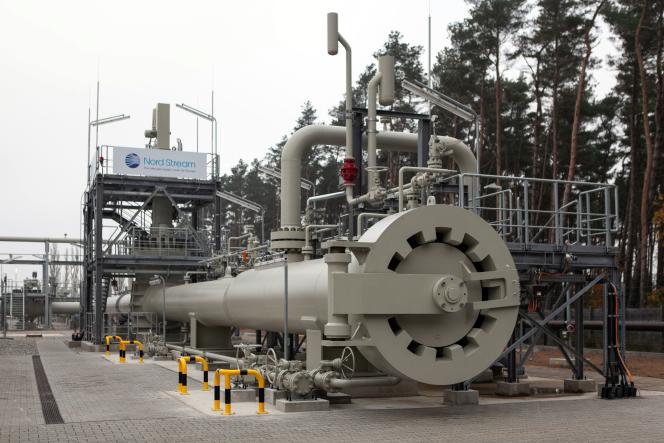It is not yet panic among Europeans, but it is starting to look like it. Because, in terms of energy, Moscow is the master of the clocks, which rations its gas deliveries to the Old Continent, sells it at exorbitant prices and drop by drop its fossil energy. On Monday, July 11, the Russian company Gazprom will begin a maintenance operation for the Nord Stream 1 gas pipeline, which will largely deprive them of its services. It is a routine exercise. But, from Paris to Berlin, via Rome, there are concerns that at its end, on July 21, the Russian giant will take the pretext of this or that problem to completely interrupt its supplies.
The winter, in this case, could be harsh, since before Vladimir Putin decided to invade Ukraine on February 24, Russian gas represented 40% of European Union (EU) imports. According to a study by the Bruegel think tank published on July 7, the Twenty-Seven should reduce their gas consumption by 15% compared to before the war, if Moscow were to interrupt its deliveries, and this in the event that the season would not be too severe. For France and its Italian and Spanish neighbours, which are well interconnected, the case would be of no consequence. On the other hand, for Germany, it would mean a 29% drop in demand and for the Baltic States 54%.
“We must be prepared for further disruptions in the gas supply, or even a complete cut off from Russia,” warned Ursula von der Leyen, the President of the European Commission, in front of the Parliament of Strasbourg, the July 6. “It wouldn’t be a big surprise if [Gazprom] said, ‘We can’t restart [Nord Stream 1], we detected a problem during maintenance operations,'” German Vice-Chancellor Robert Habeck warned. June 30. “Putin is going to tell us: you can still use Nord Stream 2”, fears a senior official, while Berlin, after a long procrastination, finally decided not to put the new gas pipeline into service.
Cut or reduced deliveries
One thing is certain, no one in Europe today is talking about a gas embargo. Until the end of May, the question nevertheless animated the debates between those, like Poland or the Baltic States, who considered it inadmissible that the Twenty-Seven were financing Putin’s war by buying him hydrocarbons, and those who, like the Germany, feared the consequences of such a sanction on their economy.
But, in the end, Moscow overtook the Europeans: since the beginning of the conflict, Gazprom has constantly reduced its deliveries, exerting against them, to use the words of Ursula von der Leyen, a real “blackmail “. When, at the end of March, they were preparing to impose new sanctions, including an embargo on Russian coal, the Kremlin replied: on April 1, it issued a decree obliging energy companies to pay in rubles, according to a complex system that allowed the Russian Central Bank to support the national currency and contravened EU sanctions.
Some refused and were immediately cut off the gas. This was the case for Poland and Bulgaria on April 27. Finland followed on May 21, days after applying to join the North Atlantic Treaty Organization. Then came the turn of the Netherlands and Denmark, on May 30, the day the Europeans decided on an embargo on Russian oil. For the rest, the majority of Gazprom’s major clients – in Germany, Italy and France in particular – complied with the Kremlin’s demands, hoping thus to escape the fate of their unfortunate neighbours.
It was only a postponement. In mid-June, when the Twenty-Seven were going to grant kyiv the status of candidate for the EU, Gazprom suddenly blamed the European sanctions which would prevent it from recovering parts necessary for the operation of Nord Stream 1. In the process, France, Germany, Italy, Austria, the Czech Republic and Slovakia saw their gas deliveries reduced. In total, today, a dozen Member States are in this situation. “Russian gas deliveries are half of what they were [in 2021] in the same period,” Kadri Simson, the energy commissioner, detailed on June 27.
Intense debates
In this context, governments are working on quota plans that organize the management of the possible shortage in the various industrial sectors, and which they hope not to have to implement, as the economic and social consequences could be heavy. In these vacation times, after two years of the Covid-19 pandemic, they do not want to panic the citizens. “France considered launching a communication campaign this summer to call on consumers to be careful, but preferred to wait so as not to worry,” a source told the Commission. Between soaring prices and rationing, the Elysee Palace fears a new surge of “yellow vests”.
In parallel, in Brussels, the Commission is working to present, on July 20, an “emergency plan to reduce energy demand” which will be based on this preliminary work by the Member States. In recent days, the debates have been intense. There are those, like Kadri Simson, who favor rationing industrial activity so as not to jeopardize the EU’s efforts to achieve carbon neutrality by 2050. Even if it means putting thousands of workers on technical unemployment. And the others, like Paolo Gentiloni, the Commissioner for the Economy, or Thierry Breton, his counterpart in the internal market, who fear the implications of such an option and defend a scenario that would give greater importance to the diversification of supplies.
Thierry Breton has done his calculations. While before the war Russia delivered to the Twenty-Seven 155 billion cubic meters of gas, the United States, Egypt, Qatar, West Africa, but also Norway or Azerbaijan could within a year to supply them with a third of this quantity. It is difficult to go faster and further, when we are talking about constrained resources. In addition, some factories could operate with oil instead of gas, particularly in cement or refineries, without requiring major work, which would save 7 billion to 8 billion cubic meters of gas.
Above all, the ramp-up or reopening of coal-fired power plants could, in the very short term, make it possible to replace up to 30 billion cubic meters of Russian gas. Germany, France, the Netherlands and Austria have already made this choice. Italy could follow. As for the countries whose electricity still comes massively from coal, such as Poland or Bulgaria, they have no intention of restraining themselves. “Even if [this] were to cause us to delay our ambitious climate goals, it is nonetheless a necessary condition for a strong Europe capable of resisting Russia and supporting Ukraine”, said the Polish Prime Minister , Mateusz Morawiecki, to the Financial Times, July 4.
“Need a binding mechanism”
Ursula von der Leyen will therefore have to find a narrow path between the climate emergency and the energy emergency, which is acceptable to the Member States, without which nothing can be done. Whatever it decides, it will have to put in place a mechanism to coordinate their quota plans if it wants to protect the internal market and industrial value chains. “If Germany decides to shut down such part of its industry, the consequences will immediately be felt elsewhere in Europe,” said a senior official.
Another challenge which will also test the solidarity of the Twenty-Seven, the Commission will have to ensure that they do not draw on gas reserves in a disorderly way, so that no one is harmed. On June 27, the Europeans agreed to fill their underground gas reserves to “at least 80%” of their capacity by November 1 – today they are at 56% -, which should enable them, in the event of a cut, to avoid the worst. But stocks are growing “slower”, half as fast as before gas supplies from Moscow plummeted since mid-June, Robert Habeck warned on June 30.
And, in the event of a shortage, the agreement does not say according to which rules the Twenty-Seven will be able to draw on their reserves. We must “ensure that [in this case] the gas goes where it is most needed,” said Ursula von der Leyen. Educated by the precedent of vaccines or masks during the pandemic, when Berlin first went it alone before playing the game of solidarity, she knows how difficult the exercise will be. “We need a binding solidarity mechanism within the EU,” insisted Manfred Weber, the chairman of the conservative group of the European People’s Party in the European Parliament, on July 6.
“It’s going to be very complicated”, recognizes a diplomat, who recalls that the Commission has proposed to the Member States a mechanism for the joint purchase of gas, on the model of what has been done for vaccines against Covid-19 , and that at this stage they failed to agree. “The German energy companies Uniper or RWE are so big that they don’t need anyone to negotiate their purchases as well as possible”, notes this source. In the weeks following the start of the war, Italy, and even more so Germany, were very active in securing their backs, even if it meant raising prices for their European partners who came after them. In this race against time before the Kremlin cuts off their taps, national selfishness has often taken over.

















